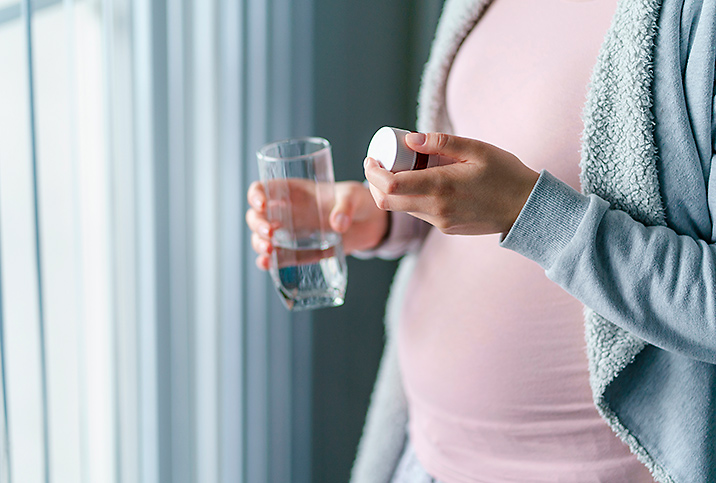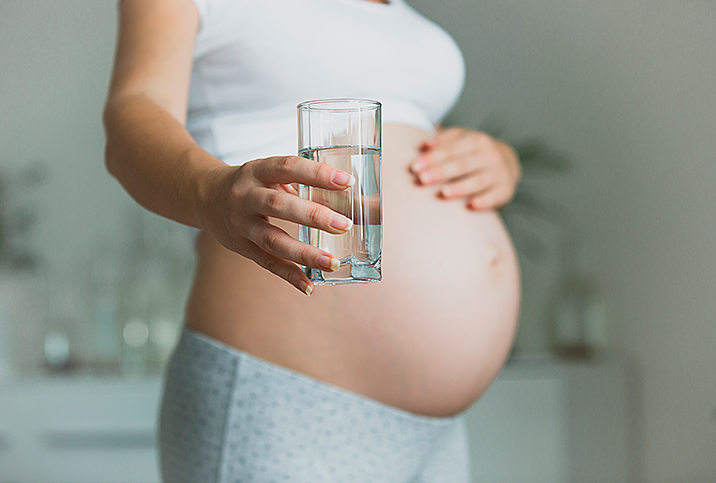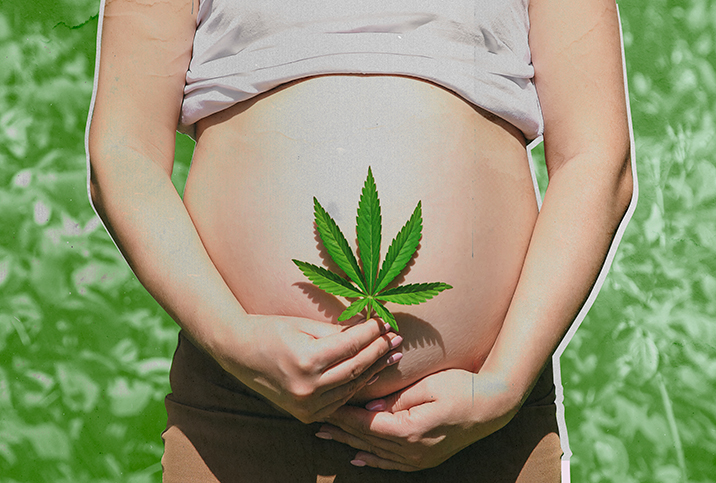How to Stay Healthy While Pregnant

Pregnancy can take a serious toll on the body. It lasts around 40 weeks or just over nine months, split into three trimesters, all of which present different challenges. It's important to make an effort to stay healthy while pregnant to protect yourself and the fetus.
Many steps you take to stay healthy while pregnant are the same ones nonpregnant people take to lead a healthy lifestyle, such as maintaining a balanced diet and getting enough sleep.
"The importance of staying healthy whilst pregnant is very similar to staying healthy when not pregnant, but with the added benefit of ensuring a healthy, growing baby, too," explained Sarah Welsh, a gynecologist in London and co-founder of sexual wellness brand HANX.
You should have regular appointments with your doctor while pregnant, so consult them about any problems or concerns about your health. Welsh also suggested regular dental checkups, as hormone changes can affect your gums and make infections like gum disease more likely.
Your body's needs change as you move through trimesters. However, there are a few activities to avoid and some lifestyle habits to maintain throughout your pregnancy to stay healthy.
Avoid alcohol
Drinking alcohol while pregnant can be very dangerous, increasing the risk of miscarriage and premature birth. When you drink alcohol, it passes from your blood through the placenta to the fetus. Unborn babies cannot process alcohol well, so exposure can seriously damage their development.
"Before conceiving, if your pregnancy is planned, you should look to make lifestyle choices, such as cutting out alcohol, to help," Welsh said, adding that doctors advise against drinking alcohol throughout the entire pregnancy to prevent issues such as fetal alcohol syndrome.
Drugs, smoking and caffeine
Recreational drugs can also damage the fetus. Like alcohol, these substances can cross the placenta and affect the baby's growth. If you regularly used recreational drugs before getting pregnant, seek medical advice to help you quit. Stopping drug use abruptly without professional help could lead to withdrawal issues or other side effects.
Similarly, smoking tobacco can harm a fetus by restricting its essential oxygen supply. Therefore, it's best to avoid smoking while pregnant. You can also seek professional guidance if you need help to quit.
Excessive caffeine crosses the placenta similarly to drugs and alcohol. It's best to eliminate or restrict caffeine intake while pregnant. Welsh recommended sticking to less than 200 milligrams daily, which is around two cups of instant coffee.
Regular exercise can help with labor
Regular exercise can keep you healthy during pregnancy. It promotes blood flow to the placenta, which can help with your baby's growth and development. Exercise can also help you prepare for labor and make it easier to transition back to your normal workout routine after giving birth.
"Regular exercise is also helpful in supporting your mental well-being, as well as reducing pregnancy-related problems such as back pain, swelling and constipation," Welsh said.
However, you may have to limit the type and intensity of exercise you do as your pregnancy progresses, switching to gentler exercises such as swimming and walking in the third trimester.
"The majority of activities are safe in pregnancy, but make sure to speak with your health professional before starting any new [exercise] or continuing current exercise in pregnancy," Welsh recommended.
Avoid dangerous sporting activities that risk falling or trauma, such as horseback riding, skiing and ice sports.
"You should avoid exercises that involve holding your breath or require you to be lying on your back for extended periods of time. Especially in your third trimester of pregnancy when your bump is getting bigger, lying on your back can affect the blood flow to the baby," Welsh said.
She added that you shouldn't start a new exercise if you're not used to working out. In addition, avoid exercising in hot weather, as pregnant people are more prone to dehydration or injury in these conditions.
No pregnancy diets
As is the case when you're not pregnant, it's essential to get a well-balanced diet full of nutrients and minerals.
"Pregnancy is not a time to diet," Welsh said, explaining that restricting your diet could be potentially harmful.
Eating well also allows you to be in good shape for delivery and recovery after the baby is born.
"Ensuring you keep a healthy weight and diet will reduce your risk of gestational diabetes in pregnancy, which increases your risk of a large baby, preterm delivery, a baby with breathing problems and/or low blood sugar levels, and even stillbirth," Welsh said.
Some foods should be avoided during pregnancy because they can carry infections, including listeriosis and toxoplasmosis. These conditions can be life-threatening to an unborn baby and can cause congenital disabilities or miscarriage.
These foods include the following:
- Unpasteurized cheeses, including brie, blue cheese and camembert
- Unpasteurized milk or juices
- Raw eggs
- Raw and undercooked meat or fish
- Deli meats
- Fish high in mercury, including shark and marlin
Drinking enough water during pregnancy is also more critical than usual, as your blood volume increases dramatically. Staying hydrated can help with common pregnancy problems such as constipation and tiredness.
Stay in bed a little longer
Most pregnant people feel more tired than normal because of hormonal changes, especially during the first 12 weeks. It's important to get as much rest as possible, even if you're finding it difficult to sleep.
"Make sure you get enough sleep and maintain good social connections to help reduce stress and increase your energy and boost your mood," Welsh said.
You might need more sleep than usual, so make sure to listen to your body and let yourself stay in bed a little longer or nap during the day if necessary.
Managing stress
Although pregnancy is an exciting time, it can also be extremely overwhelming and lead to stress. It's essential to look after your mental health during pregnancy to prevent low moods, anxiety and depression.
Activities such as meditation, pregnancy yoga and exercise can help, but make sure to speak to a mental health professional if you're struggling.


















